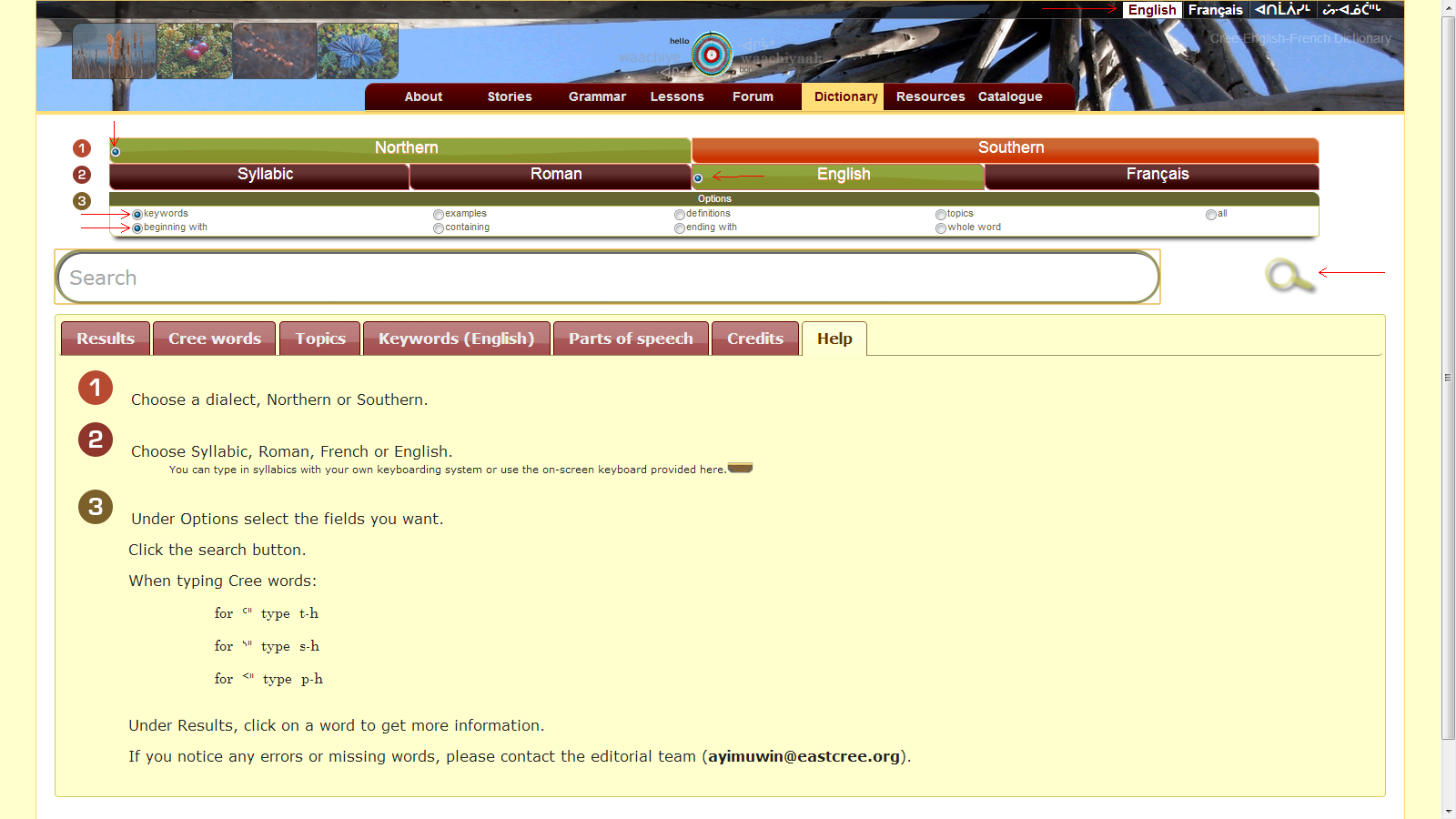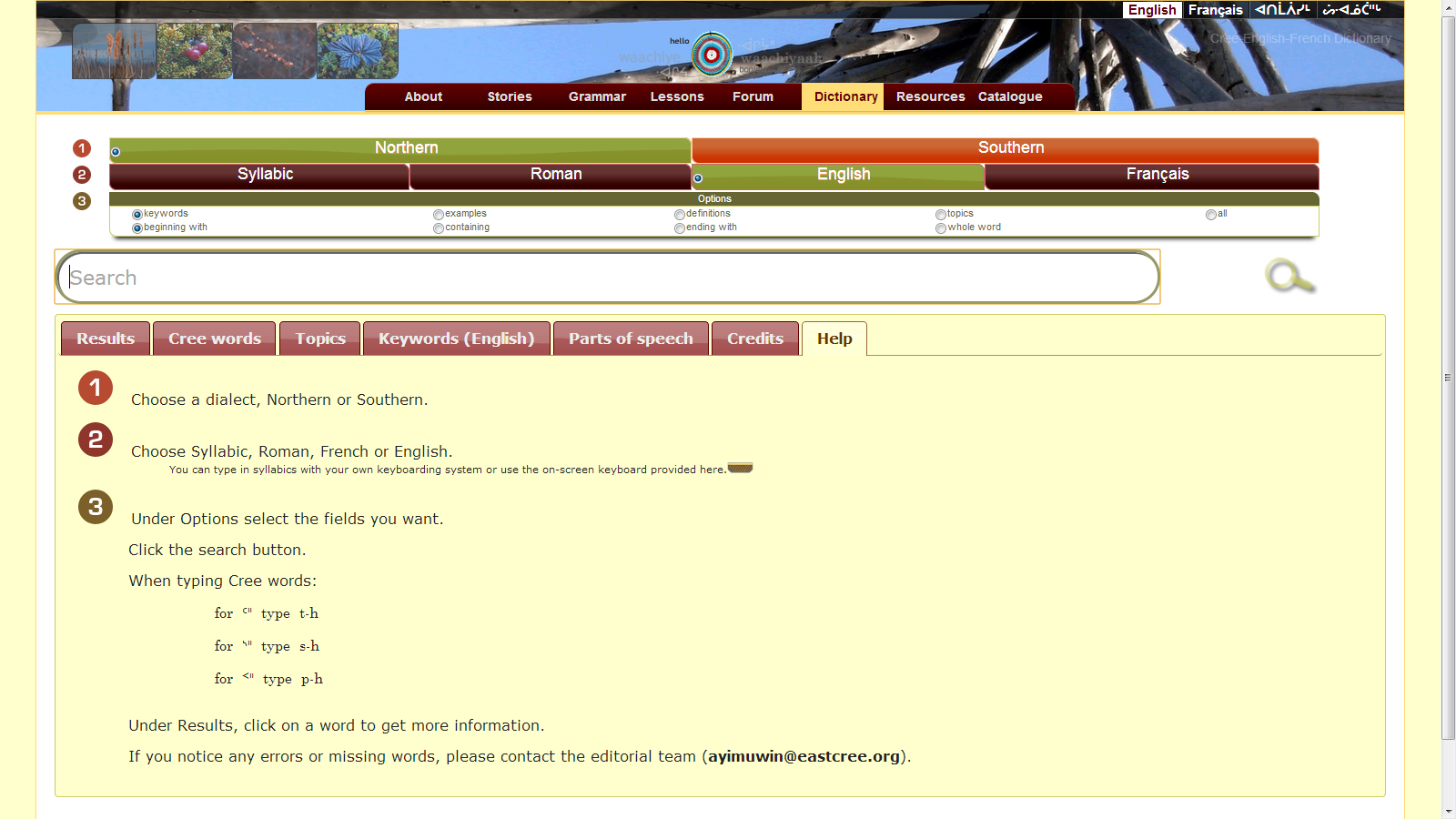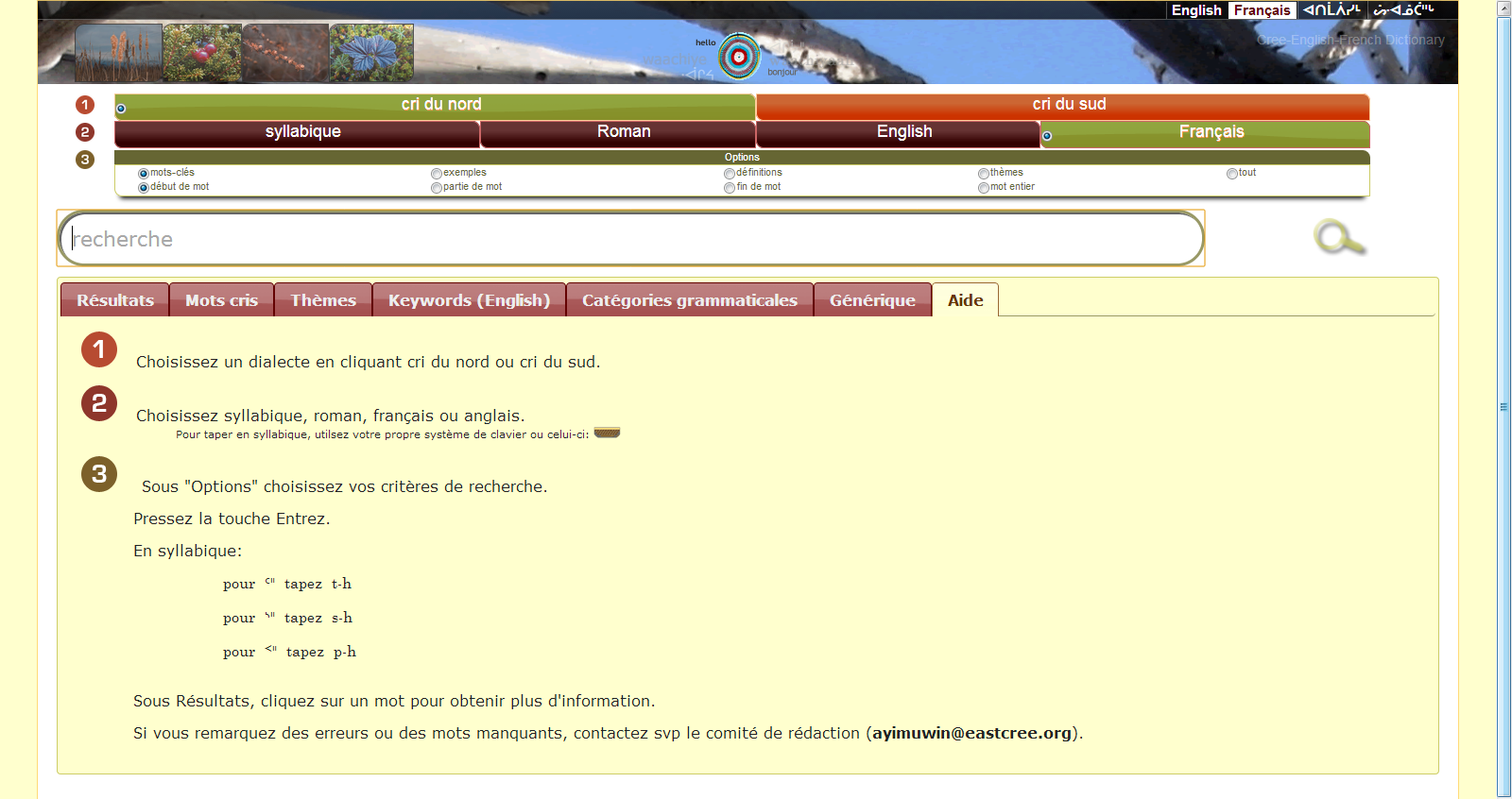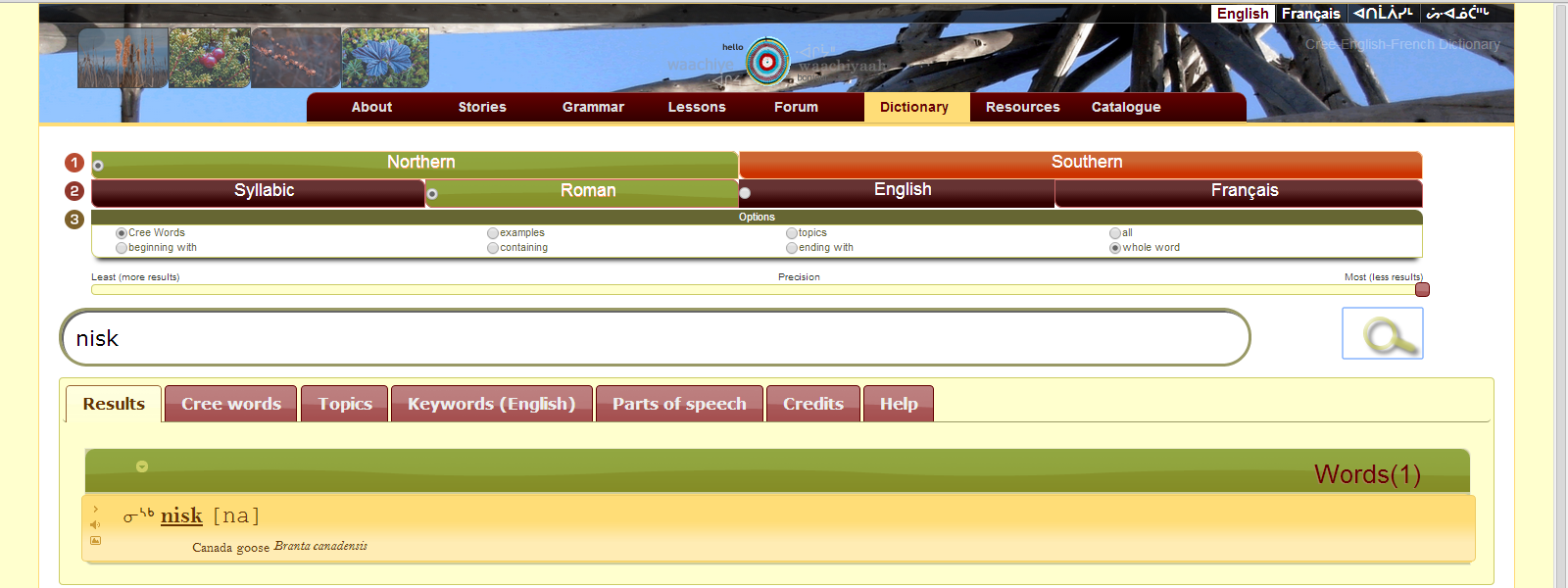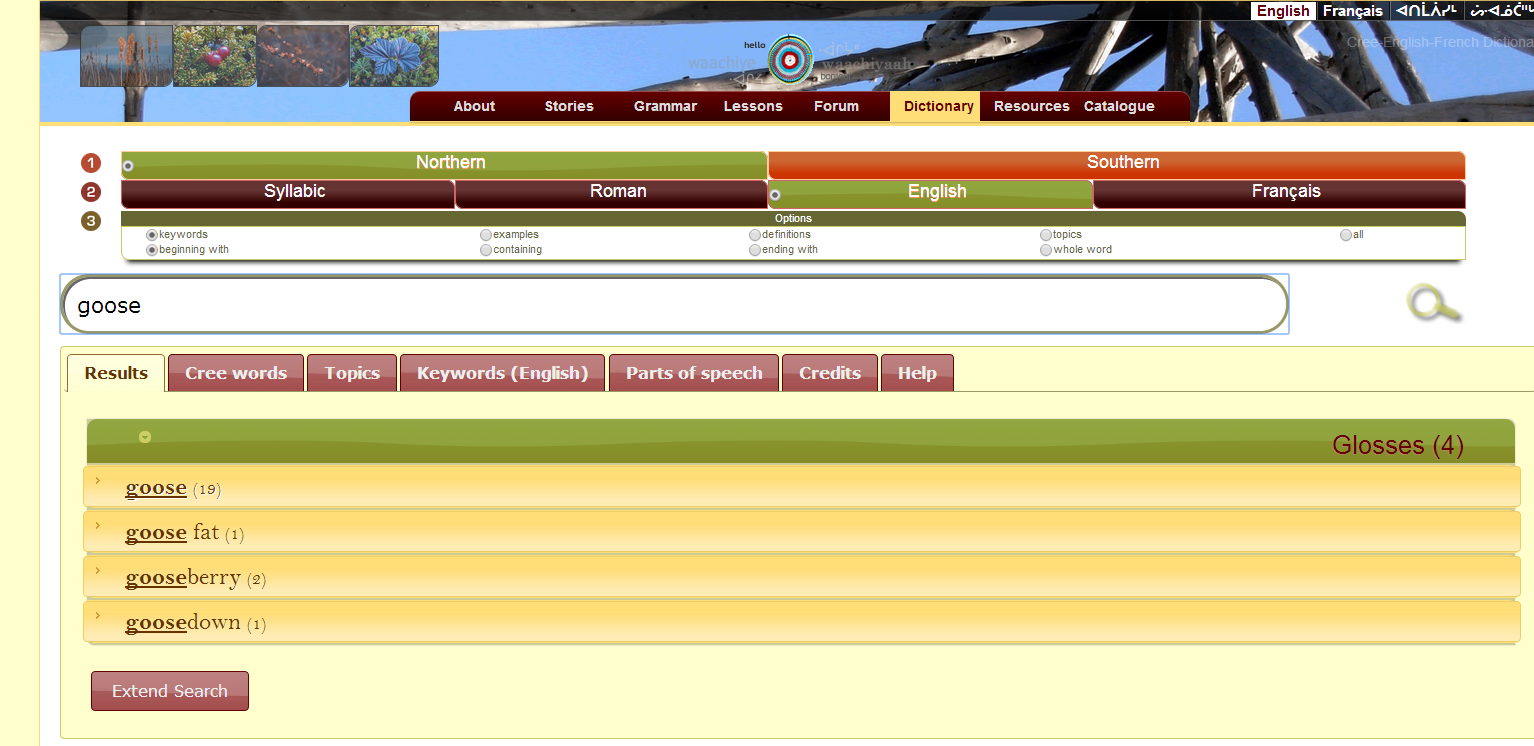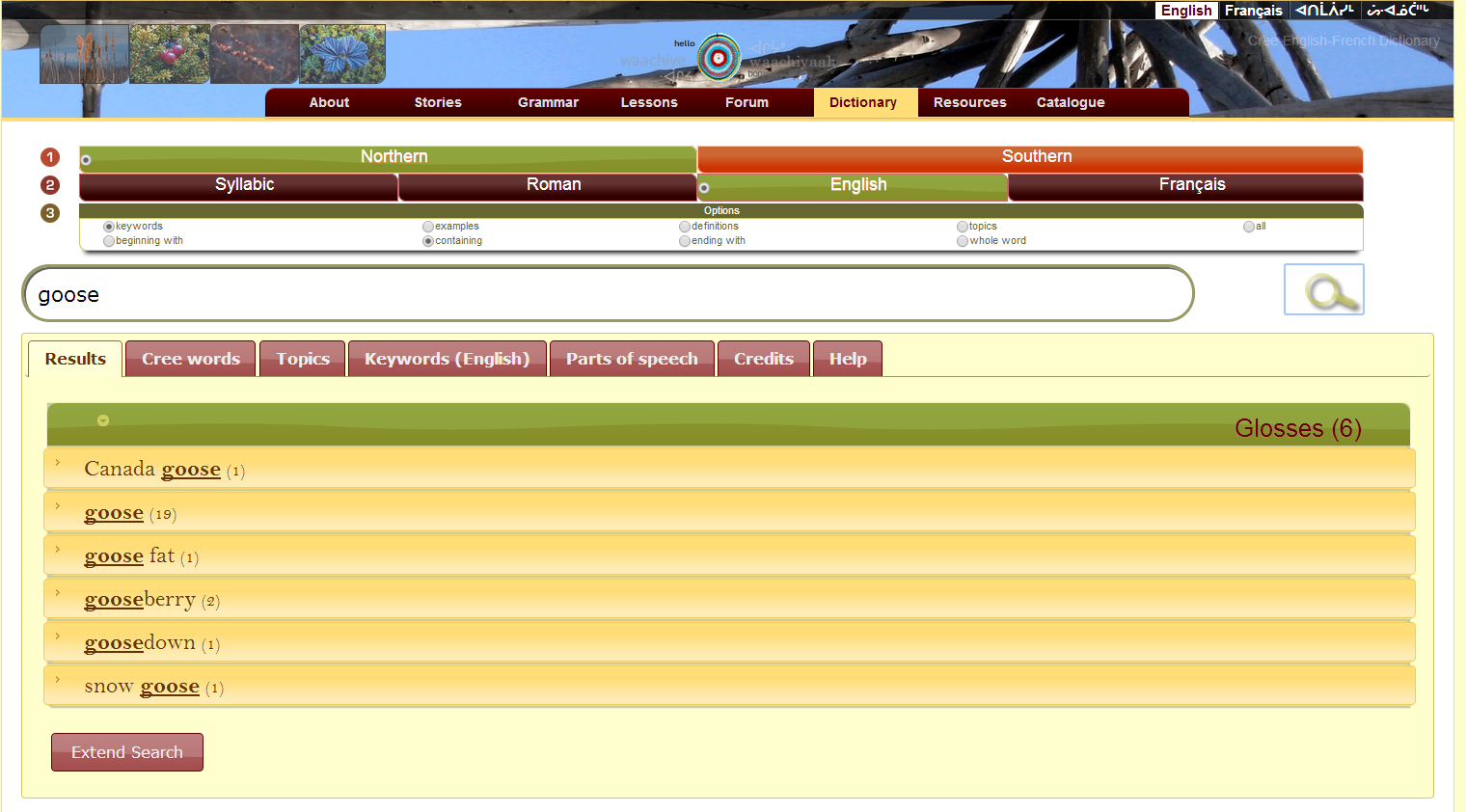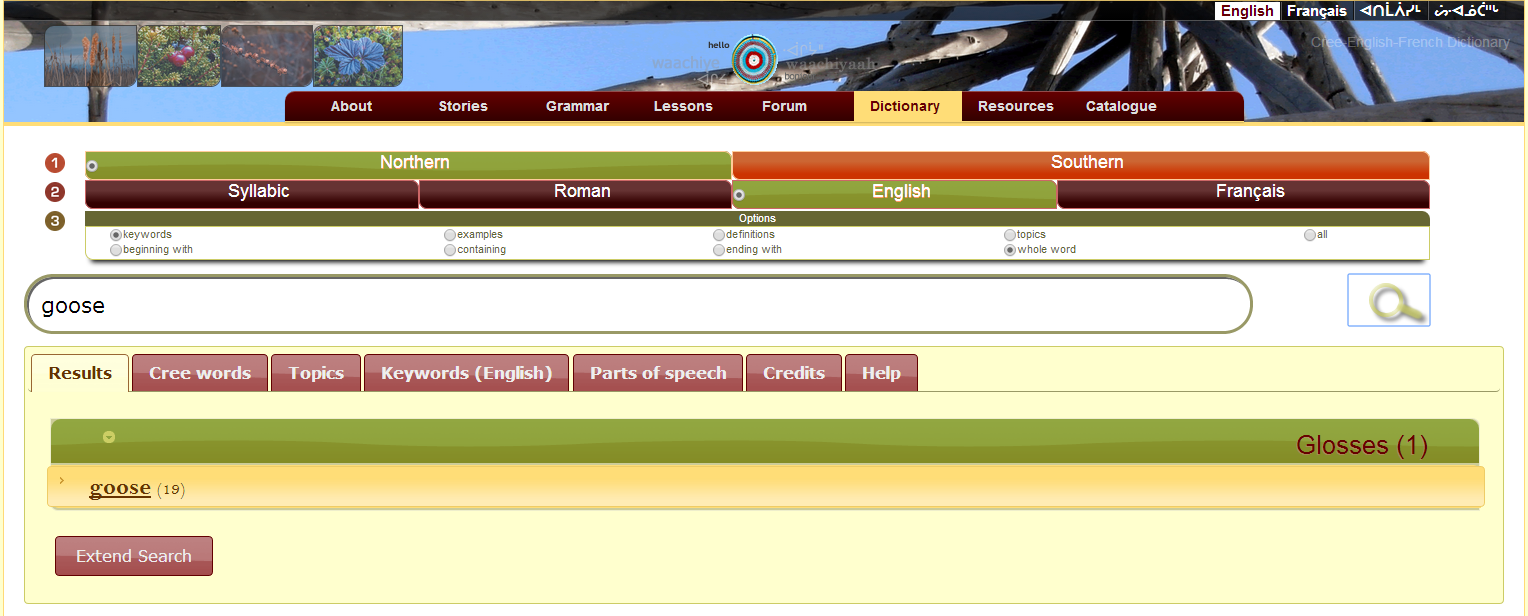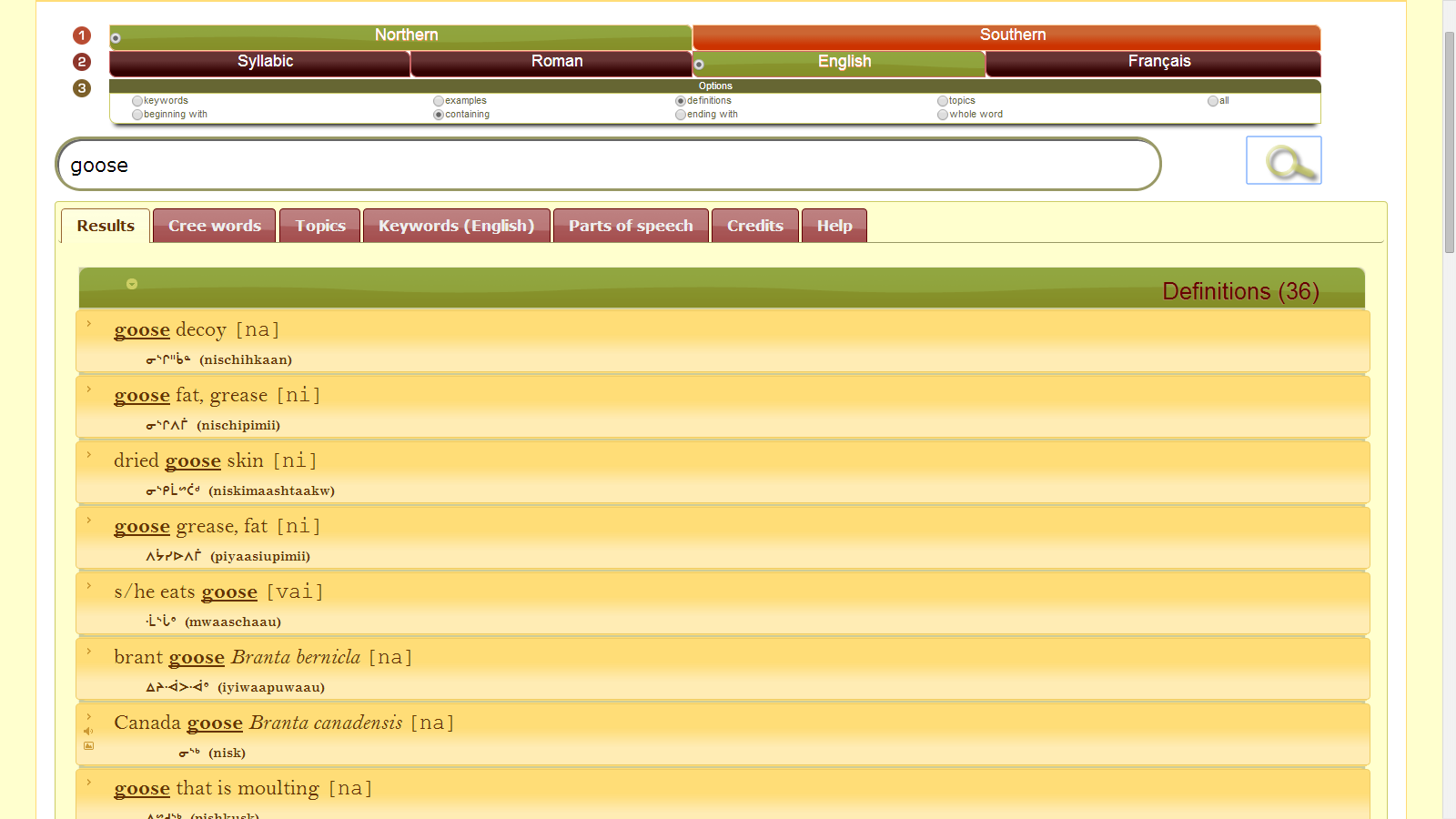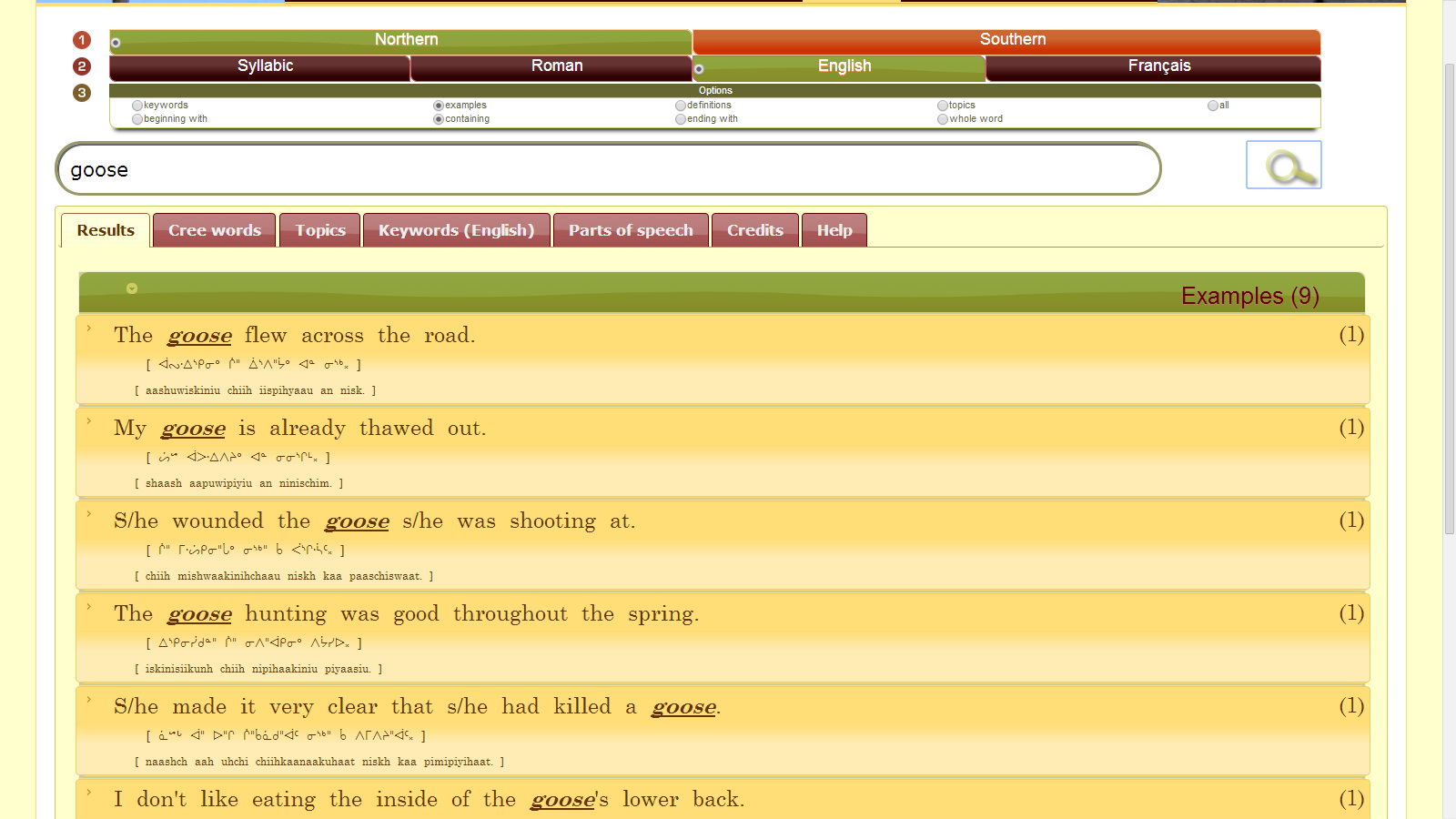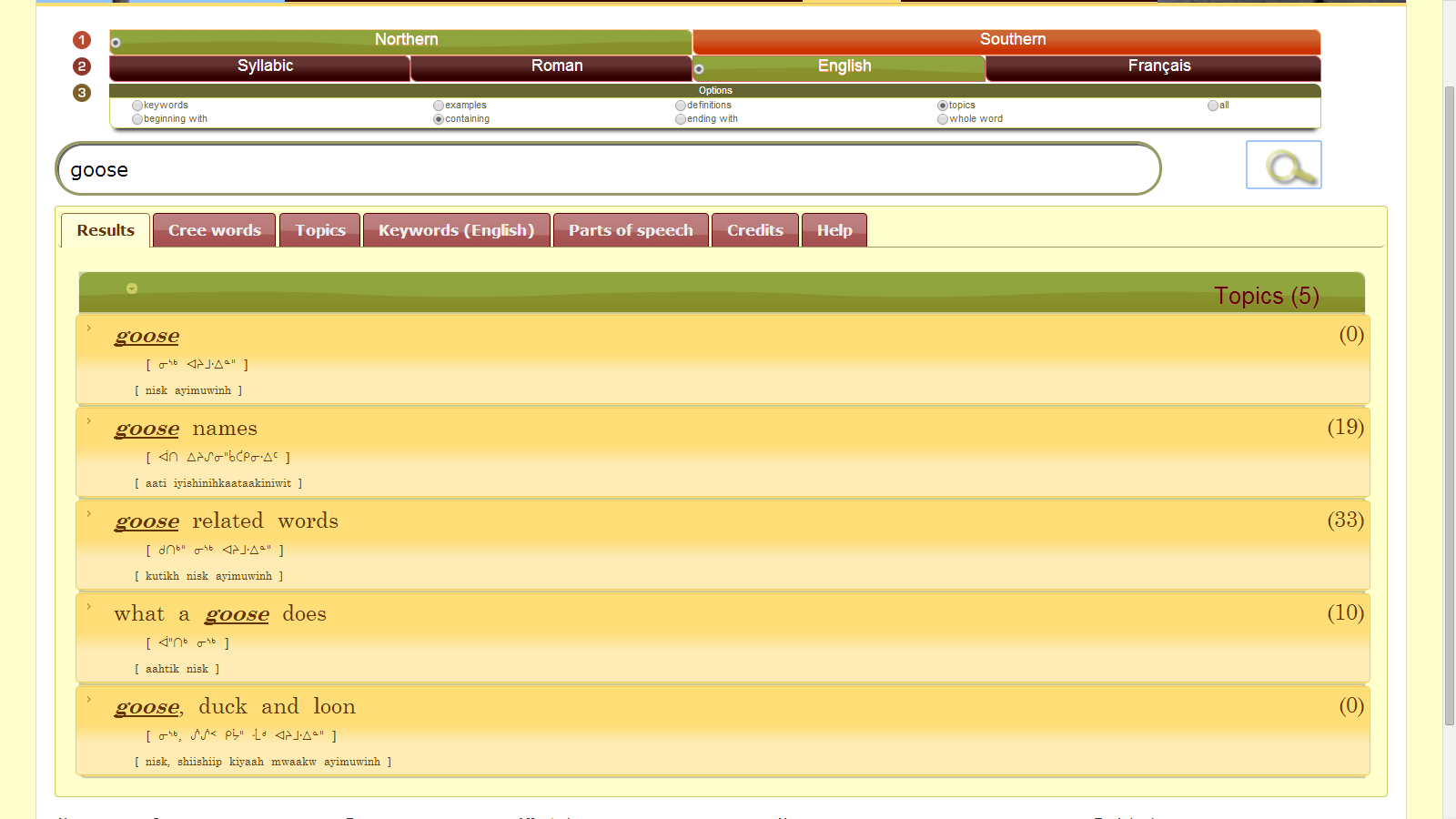How to use the online Cree Dictionary
Introduction
This document aims to explain and demonstrate how to use the new Eastern James Bay Cree Dictionary found at https://dictionary.eastcree.org
- Understanding the Entry
- Understanding the Interface
- Examples of Cree-based search (in the head word, examples and topics)
- Example of the Relaxed search
- Examples of English-based search (in the definition, keywords, examples and topics)
Understanding the Entry
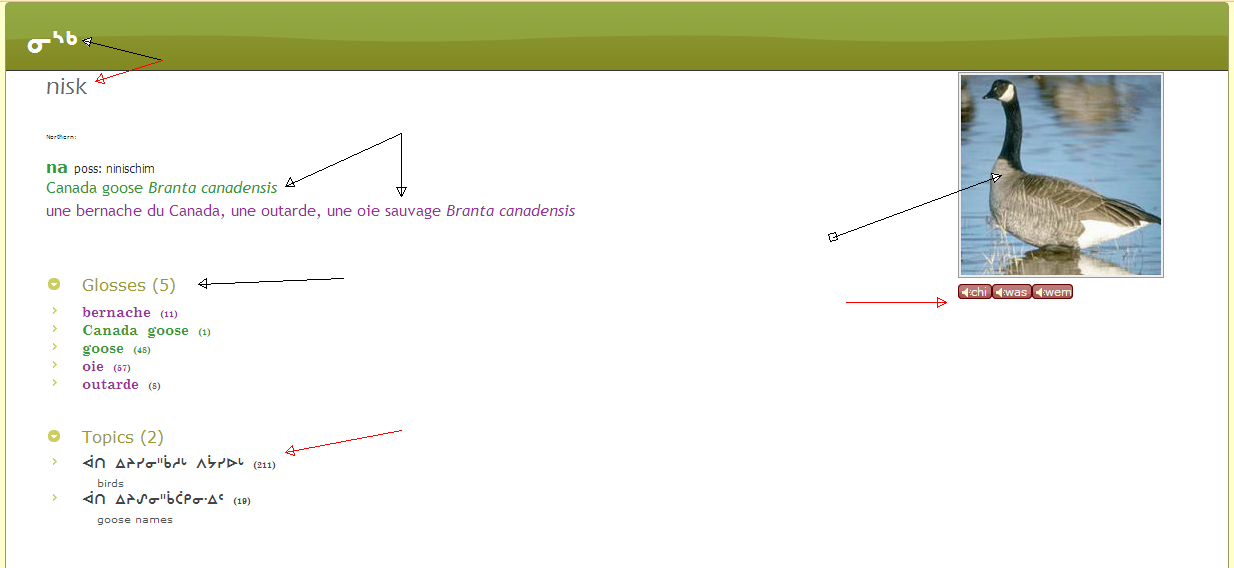
The Cree word
This is the syllabic and roman spelling of the word entry.
Part of Speech and Grammatical Information
This line indicates the part of speech as well as other grammatical information relevant to the entry.
Definition
This section provides the English and French definitions of the entry.
Example

Some entries may contain examples. Each example is displayed in syllabic and roman and contains translations of the text in English and French.
Keywords / Glosses
This section provides the English and French keyword(s) for the entry.
Topics / Themes (Thematic Dictionary)
This section provides the topics or theme of the entry.
Media
If we have an image for the entry it will be displayed. We may also have audio recording from various communities which will be displayed as seen in the image above. You may then click on the button to hear the audio recording of the Cree word.
Below are the abbreviations representing the communities for which we may have audio recordings.
| Chisasibi | |
| Wemindji | |
| Waskaganish | |
| Mistissini |
Understanding the Interface
Interface Language
First, make sure the interface language currently selected is the one you want. The interface language will determine the language on the various buttons throughout the site, as well as the language of the search results.
For example,
if you choose the English interface, this is how the screen will appear:
If you choose the French interface, it will appear like this:
The interface is also available in Cree syllabics (Northern & Southern Dialects)
Dialect

Next, you must choose the dialect of Eastern James Bay Cree in which you would like to search and browse (the dictionary has two: Northern and Southern).
Select the dialect of your choice by clicking in the button indicated in the picture below:
You will notice that the dialect button you selected now has a green background, while the other has an orange background. This is a visual cue to let you quickly see which dialect you’re working with.
Language

The next row is where you select what language you will be typing in to conduct your search. If you select:
- syllabics, the dictionary will search all of the syllabic fields in the database (i.e., it will not search for any words written in roman or English/French). **Note that if you select this option, you must also type in syllabics.
- roman, the dictionary will search all of the roman fields in the database.
- English/French, the dictionary will search all of the English/French transliterations in the database.
You will notice that the language/form of writing you select now has a green background, while the others will have a dark brown background. This is a visual cue to let you quickly see which language you’re searching in.
Options

This section allows you to refine your search parameters. You can either expand or narrow your search to generate the results you want.
The first row, in conjunction with the language/form of writing you selected, will tell the dictionary which fields it must search in.

-
keyword: if you selected English or French, selecting keyword will run a search on all the keywords and glosses in the database.
If you selected Syllabics or Roman, the search by keyword will be performed on the headword of dictionary entries. - definition: the dictionary will search all English and French definitions for the word(s) you typed in the search field.
- example: the dictionary will search through the examples or example translations of the entries for the word(s) you typed in the search field.
- topic: the dictionary will search through the topics or themes for the word(s) you typed in the search field.
The second row holds options for where to search within the word itself. There are four options:
- beginning: when this option is chosen, the search will return XYZ, where X is the beginning of the word, Y is the middle, and Z is the ending of a word.
- containing: when this option is chosen, the search will return
XYZ,
XYZ,
XYZ,
XYZ - ending: when this option is chosen, the search will return XYZ
- whole word: when this option is chosen the search will return XYZ. The spelling must be exact to use this option, otherwise you will get no results.
Examples of Cree based Search
If you know the spelling of the Cree word you are looking for, you can perform your search by using either the syllabic or roman orthography of the word.
To type using the syllabic orthography, you need a virtual syllabic keyboard like “Keyman” (see https://www.eastcree.org/cree/en/resources/how-to/cree-fonts/).
If you don’t have a syllabic keyboard, you can use the built-in Flash-based keyboard to type in syllabics (you need Adobe Flash Player installed).
You can active it by clicking on the keyboard icon ![]() in the typing field.
in the typing field.
Searching for nisk in northern dialect
Will result in
Example of the Relaxed search
Our dictionary has a built-in Cree spellchecker which allows you to control the precision of the returned suggestions.
The more precision you choose, the less results you get.
For example, if you are looking for the word “nisk” but you type “niisk“,
our spellchecker (the relaxed search engine) automatically gets activated. By default, it is set to be as precise as possible to return the fewest results to match your search query.
PS: This option is only available if you choose to search in Syllabic or Roman
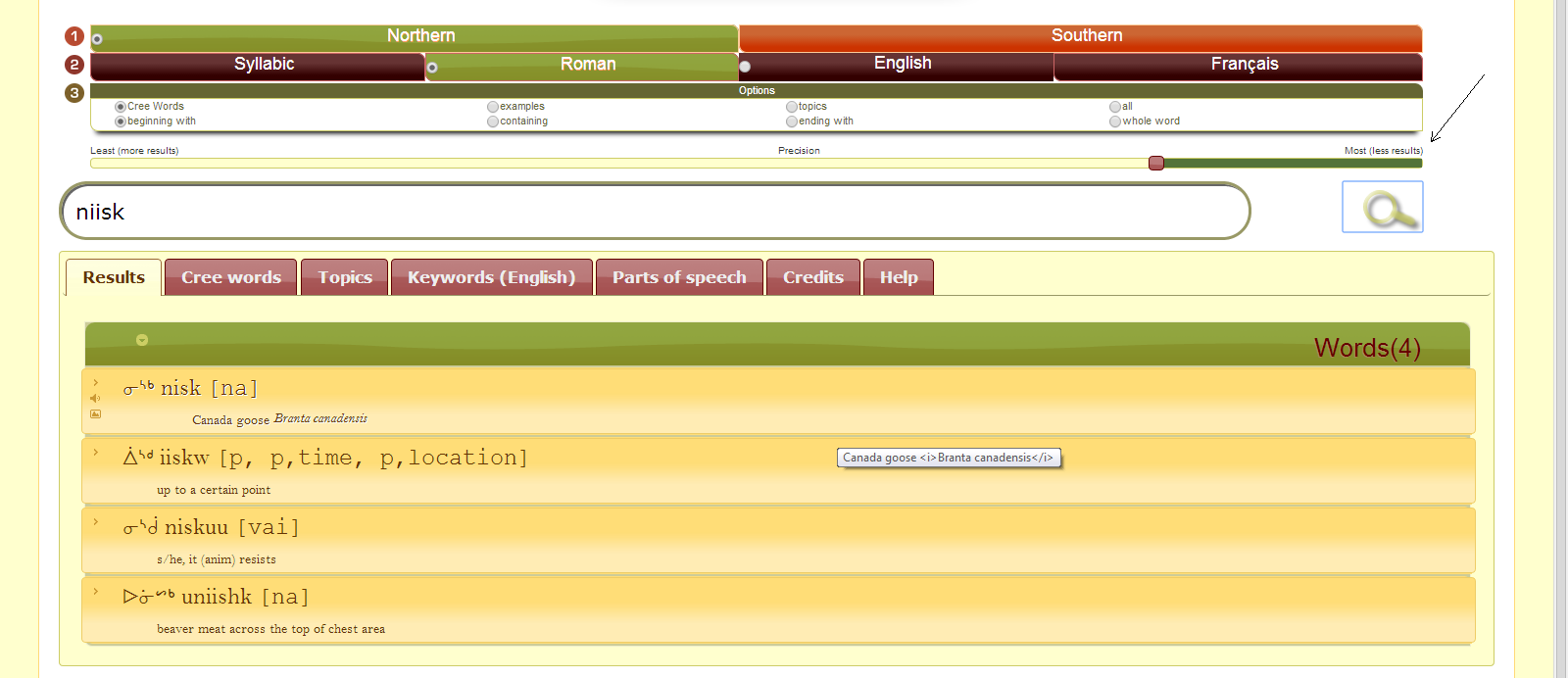
If you reduce the precision, you will get more results. This is useful when your margin of possible spelling errors is large.
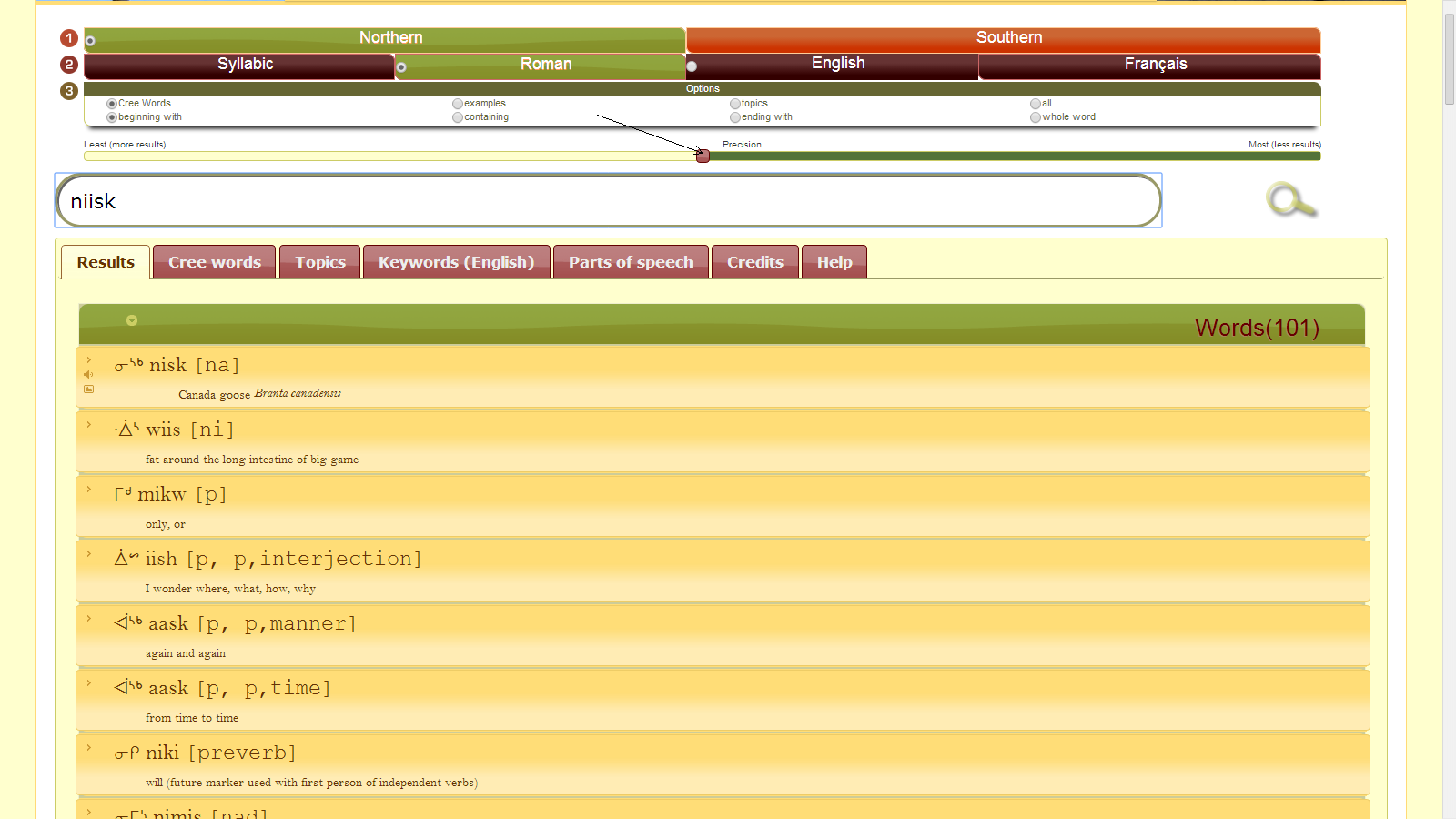
Examples of English based Search
If you want to find the East Cree word for “goose” in our dictionary, you have few options. Below, you will see how the search works in combination with the various options to provide different results.
Note how Options 1a, 1b, and 1c use beginning / containing / whole word, respectively, to produce different results.
